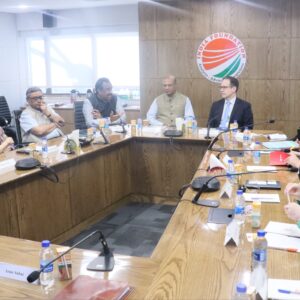Economic policy response to the COVID-19 pandemic has to be formulated in two-phase: soft landing and rapid recovery. The first phase response, which spans over the next three months, ensures that there is no structural damage to the economic institutions while the government firefights the health impact of the pandemic. The second phase is about kickstarting long-pending structural changes and tactical responses to emerging opportunities in global markets and investments. Based on broad consultations with various policymakers, economists, MSME and industry representative bodies the following ‘immediate term’ recommendations have been proposed to ensure soft landing of our economy.
- On rural livelihoods front, we propose to frontload PM Kisan Samaan Nidhi payments over the next three months. Masks and sanitizer kit to be procured locally and distributed free through PDS shops. APMC to be waived for large corporate purchasers so that they can set up their own supply chains. Kisan credit card should be automatically rolled over and limits increased by 25%. Rural areas may not see immediate disruption, though migrant workers would struggle to send payments back home. Therefore, MNREGA should be increased to 150 days and should include all rural occupations (e.g. artisans).
- On urban livelihood issue, the informal workers should be rapidly enrolled for NFSA benefits through simplified e-registration at urban PDS shops. Ayushman Bharat benefits should be extended for informal workers so that they are not fearful about returning to work. Government initiatives like special trains, help desks and interstate coordination of labour commissioners should be taken up to bring back migrant labour to urban centres in a structured manner. These workers carry risks of reverse migration and the spread of disease. To mitigate this, there should be a provision for monthly income support for at least three months.
- In order to ensure MSME sector is protected from the hardest impact, we propose a 20,000 Crores fund that could generate over 2 Lakh Crores of loans (with 12% NPA provision for MSMEs). The fund should have easy conditions to make it accessible for example a collateral-free Rs. 1 Crore loan at 0% available for MSMEs. No adjustment of grant or working capital support towards interest on term loan and/or working capital should be allowed. IBC to be suspended and the RBI prudential norms to be reviewed for specific sectors. Debt restructuring and rollovers should be allowed. Recently announced (2020 Budget) Subordinate Debt Guarantee scheme to be expanded to 30,000 Crores. All MSME outstanding payments (tax refunds, regular invoices, and fees) from Centre, State, and PSUs to be paid immediately. By Union government estimates this amount is to the tune of Rs 5.5 Lakh Crores. An Empowered Group of Ministers under the leadership of the MSME Minister should ensure effective policy execution as well as continuous industry engagement and real-time bottleneck/grievance redressal.
For banking and financial sector, a TARP (Troubled Asset Relief Program) like program is proposed for corporate bonds, as the corporate bond market is effectively jammed and risks might trigger a cascade of defaults. Here, the government provides the guarantee and RBI provides liquidity to the SPV entity. In order to finance the deficit, RBI should monetize the deficit up to 4-5% of GDP by buying special “Covid Bonds” directly from the Government. State governments should be given a wider (additional 25%) “Ways & Means” space to make payments for legacy delayed heads. Direct intervention in the bond markets may be needed to force down government bond yields for instance on Government 10-year paper yield should be brought down to 5% (it is still to 6.3% despite recent 75 bps cut in policy rate). All payments to the private sector from all levels of government (and PSUs) needs to be made on a war footing. This includes tax refunds, supplier/contractor payments, power company dues etc. Even in disputed cases, there is already a cabinet decision about immediately releasing 75% payments to private party if they have won an arbitration. The government should instruct government agencies such as EPFO to resume buying corporate bonds. RBI to direct banks to increase working capital limits of all borrowers equal to 3-6 months of cash flow requirements. RBI to provide back-to-back financing to the banks, and GOI to backstop the credit risk of the banks. Such loans should be repayable only over the medium-term. This action could be tied to management salary haircuts and commitments to not lay off workers.
On the macro-economic front, taxes that get in the way of risk-taking should be removed; for instance Long Term Capital Gains Tax. The government is unlikely to get any significant collections from this for at least a couple of years. Hence, this should be abolished. Similarly, the “angel tax” enabling provision of Section 56. 2 (vii) of Income Tax should be abolished.
For the infrastructure sector, all industries related to long-distance travel (airlines, airports, hotels etc); within-city travel (taxis, buses, commuter rail etc); and social proximity (shopping malls, restaurants, cinemas, sports, conventions etc) facing acute distress, should be offered concessional GST rates for 6 months. RBI should direct banks to freeze all debt principal payments of corporates in these sectors starting March 1, 2020 for a 12-month period. Of the installed power generation capacity of 370 GW, 283 GW consist of Thermal, Hydro and Nuclear power running at Plant Load Factor of 50% pre-Covid. The demand in post-Covid is further down to only 120-130 GW. Preservation efforts are needed to ensure that situation of persistent negative EBITDA of power generation companies should be addressed and cash flows support requirements to keep the generation system in continuous running are made available.
Health infrastructure has to be the centrepiece of economic recovery. We have to make public health the engine of state-funded investment drive.
In order to implement the above recommendations, tight, integrated, and rapid execution is needed. Inter-departmental and inter-institutional differences have to be addressed.Every crisis throws a unique opportunity to think bold and look for out of the box approaches. A confident Indian leadership can transform this crisis moment into one of long term one-upmanship.
(Excerpts from India Foundation’s report “COVID-19 Economic Strategy Plan: Soft-landing & Strong Revival” compiled by Rajat Sethi. The second-phase recommendations to follow shortly)



